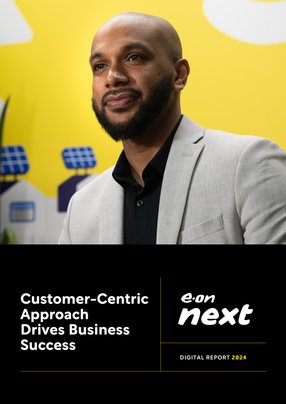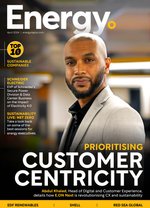E.ON Next: Customer-Centric Approach Drives Business Success
The energy sector today is navigating tough challenges. Fuel shortages and record prices have resulted in a global energy crisis driving up bills for consumers and businesses, while energy suppliers are under greater pressure than ever to consider sustainable energy to meet customer needs.
According to McKinsey, customer expectations are also on the rise, informed by customer experience (CX) leaders in other industries like Amazon, Uber and digitally native companies: all of which offer seamless and personalised experiences.
Amid these challenges, energy suppliers must think differently. E.ON Next, a startup company from the main E.ON Group, was founded with the aim to challenge and innovate the energy space in the United Kingdom.
As Abdul Khaled, the company’s Head of Digital and Customer Experience, explains, E.ON Next was built from the ground up with new direction, leadership and culture, embracing a startup mentality to get closer to customers.
A core principle of E.ON Next, he says, is the mantra of customer-centricity and breaking the barriers between departments and functions. Becoming one organisation working towards a common goal can lead to business success.
“We've got engineers sitting alongside customer service agents, really trying to bridge the gap between delivery and those that are really close to the customers,” Khaled explains. “That's been a real driving factor behind the culture of E.ON Next.”
E.ON Next: Building an award-winning culture of excellence
Emphasising his passion to build and craft products and experiences, Khaled began his career as a developer. His broad skills and experience have shaped him for the corporate world, working with companies such as Cisco.
Today, looking after a team of product managers, engineers, designers, testers and analysts, Khaled’s current role at E.ON Next utilises his varied background of hands-on engineering, development, design, managing and building products and represents an interesting challenge.
“The industry we're in is very difficult. When I entered it it was a low interest category: getting customers to engage with the energy company is difficult at the best of times. When you add the energy crisis on top of it, it's now not just a low interest category – it's probably looked upon quite negatively by a lot of customers.
“As an industry, I think we've got to hold our hands up and say that we haven't done enough to break some of those myths that are out there. We also haven't done enough to be as transparent as customers need and want us to be, especially through difficult times.”
To help overcome some of these challenges, Khaled has built his team at E.ON Next from the ground up. “We're now a team of over 40, and we will probably end up at 50 by the end of the year. With that comes the empowerment to actually drive and shape the team, which is an immense privilege. It's not an opportunity that you get in many places.”
Building a team which is striving and thriving for excellence is clearly a source of pride. As Khaled describes, building a team with a culture of empowerment and creativity has been key to the organisation’s success.
“Getting people in is one thing, building a culture around it is something else,” Khaled explains. “We've got a culture of enjoyment, of empowerment, of creativity, and it's a really enjoyable place to come and work.”
This approach to the team at E.ON Next has already started to see results. Last year, in its second year of existence, the company was awarded or nominated for five different award categories in the industry. “We've got one of the highest app rating scores in the industry, and we've got one of the highest-rated digital experience scores on Trustpilot,” Khaled adds. “We're really punching above our weight, and we’re seeing great achievements on the back of it. And I think that's always something to be proud of when you can see people really enjoying what they do, delivering results, getting recognition for it and making an impact on customers’ lives.”
Moving beyond a startup mentality, and focusing on customer-centricity
As E.ON Next evolves from a startup to a more established entity, managing over five million customer accounts, it grapples with the challenges of scaling while maintaining its core focus on customer-centricity.
“One of the challenges is as the customer base has gone bigger, the company has gone bigger,” Khaled says. “And as the company has gone bigger, there have been more functions and departments that have emerged and more people in the organisations are owning and managing different parts of the customer journey.”
Khaled stresses the importance of breaking down silos and reaffirming the company's commitment to putting customers at the heart of their operations.
“I think the benefit of E.ON Next is being able to understand and rectify certain situations before they become too much of a problem,” he says. “And because we understand that, the focus on customer-centricity has now reemerged within the organisation. We started off being very customer-centric and we see as we've gone through those growing pains that you can slightly move away from that ambition.
“Where we are now is really trying to get that customer-centricity back into the agenda.”
Living and breathing customer-centricity
As part of this mission to build a customer-centric approach, Khaled described that it is vital for this to not only be something that is said, but is practical.
“If we want to get back to becoming customer-centric and really living and breathing it in all the halls and corridors and departments that we have around the organisation, it's even more important to ensure that that customer-centricity is not just something that's said, but it's something that's practical.
“A lot of companies fall short when they come in with all the right intentions of being customer-centric, but what does that really mean? What does that mean for you as an individual working on a spreadsheet, or someone on the phone lines talking to customers?”
Aiming to answer these questions is E.ON Next’s CX enablement programme. “We're really trying to implement how we enable the organisation to have not only the skills, the tools and the processes, but the overall strategy and the blueprint to drive a customer experience initiative,” Khaled explains. “And that starts with culture.”
When it comes to E.ON Next’s strategy, Khaled explains that it boils down to three topics: transparency, personalisation and simplicity.
“Especially in the industry that we're in, we know that customers want honesty and transparency. They want the message, even if it's a hard message, they want it to be transparent, they want it honestly, and they want it proactively.
“With personalisation, they need things that are catered to them and that's important across any and every industry. Personalisation has been something on top of the agenda for more than a decade. I don't think any industry or company has fully mastered it and I think it's always on the agenda.
“And then simplicity: we want to make the action that the customer wants to do easy, simple and clear.”
Using metrics and insights to provide better CX
For any business today, getting the right customer experience tools for its people to leverage is essential. Tools to leverage data insights can empower organisations to be more customer-centric.
As Khaled describes, E.ON has a department it refers to as CX Intelligence with the aim to build a 360-degree picture of the customer.
“A lot of organisations have voice of customer programmes, which are fantastic, but you tend to speak to a handful of customers and listen to their feedback in certain control situations and that almost gives you a piece of the puzzle. What we like to do is get the full picture.”
To paint this picture, E.ON Next aims to understand what customers are saying through various channels, thanks to a tool from Customer Experience Intelligence platform Chattermill. Collecting feedback and insights from customers across multiple channels – from reviews on Trustpilot to a phone call or email – Chattermill’s AI-driven platform uses natural language processing (NLP) technology to understand what the true sentiment behind any particular piece of feedback is.
“A customer giving you feedback can sometimes be positive and negative. So a customer can say, ‘Great customer service on the phone, shame about the wait time’. With NLP technology, you're able to really categorise that feedback and quantify it into different categories.”
“That allows us to get really granular insights and also understand true customer sentiment.”
From there, E.ON Next can flesh out this data with surveys and interviews, collaborating with customers to drive better experiences. “We have a number of ideas, concepts and prototypes that we try and test with customers in real settings. So you've got the full 360-degree view there: understanding what customers say, looking and analysing how customers behave, really collaborating with customers to get to solutions and then validating them really gives us that CX intelligence.”
Ensuring CX initiatives are solving customer problems
When it comes to delivering these CX initiatives, the company employs an S-curve model to manage CX projects, ensuring a tight feedback loop between customers and the delivery teams. This approach allows E.ON Next to iterate quickly based on real-time customer feedback, enhancing the relevance and effectiveness of their solutions.
“S-curving is really paramount to the way that we work,” he says. “The idea is going back to the culture and the startup mentality of taking the problem finders – which are usually the people on the phones who know the customer better than anyone – and the problem solvers – which are your product delivery teams – and bringing them together and making sure there isn't a gap between us and the customer.”
When launching products, especially CX initiatives, E.ON Next goes through an S-curving group: launched to sort a database of audience which is assigned to one of the company’s customer service teams. This means that when those products are live, any feedback or interaction that the customers are having with one of E.ON Next’s customer service agents is fed immediately back into its delivery teams.
“One of the things that you lose in a CX initiative is that connection with the customer immediately. Being able to adapt, react, iterate, optimise based on immediate customer feedback is so crucial, especially if you want to be customer-centric,” Khaled says. “That S-curve model really allows us to make sure we get products out there at a very low cost model, get immediate feedback, iterate, improve, optimise and continuously launch the next iterations of the products with confidence that it's actually solving customer problems.”
Future ambitions: Building customer connections and increasing value offering
When it comes to the future, E.ON Next will be looking in two phases. The first phase, Khaled says, is about getting back to basics and enabling connection with customers. “I think we've got a long journey ahead, but that's definitely priority number one: being a customer-centric organisation for our customers.
“Phase two is how do we increase the value offering,” he adds. This will involve expanding E.ON Next’s value proposition beyond traditional energy supply to innovative home solutions, such as electric vehicles (EVs), solar panels and heat pumps. “We want to be known for more than just providing energy,” Khaled says. “One of our taglines is powering everything and everyone, and that's what we want to do.”
When it comes to the future, Khaled believes that AI will be a valuable tool. “I think AI is definitely something that everyone needs to capitalise on. It's going to empower and accelerate and create more efficiencies across the board, but it will also enable new product lines.”
With personalisation being a key driver of CX, AI will have a key part to play in providing better experiences. “Personalisation has always been a difficult one for people to truly get. I think AI can really drive the agenda when it comes to hyper-personalisation. It can allow services to be offered pretty much on demand as and when.”
“I think if we get together as an industry to really harness the capabilities and fine tune it, I think we'll all be better for it,” Khaled concludes. “AI is definitely the biggest innovation right now and the biggest trend that we all need to get behind.”
Make sure you check out the latest edition of Energy Digital Magazine and also sign up to our global conference series - Sustainability LIVE 2024
**************
Energy Digital is a BizClik brand
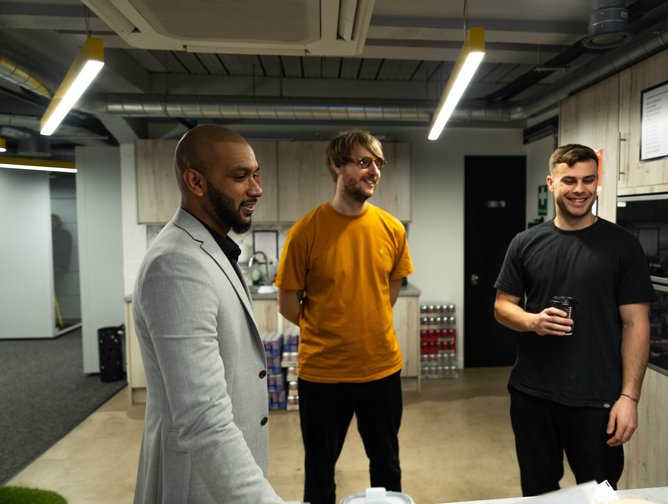
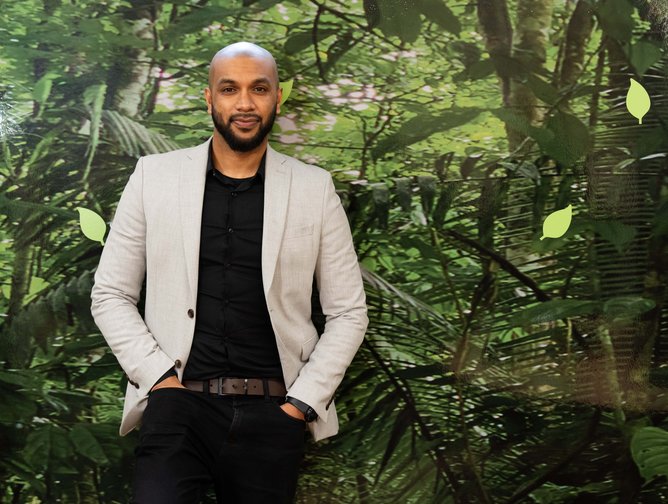
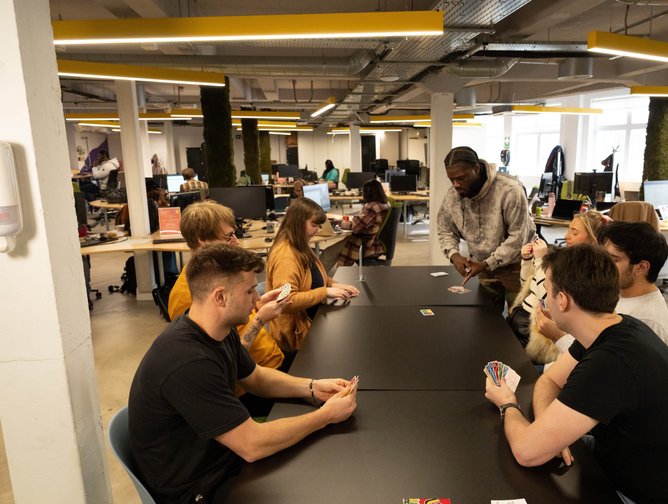
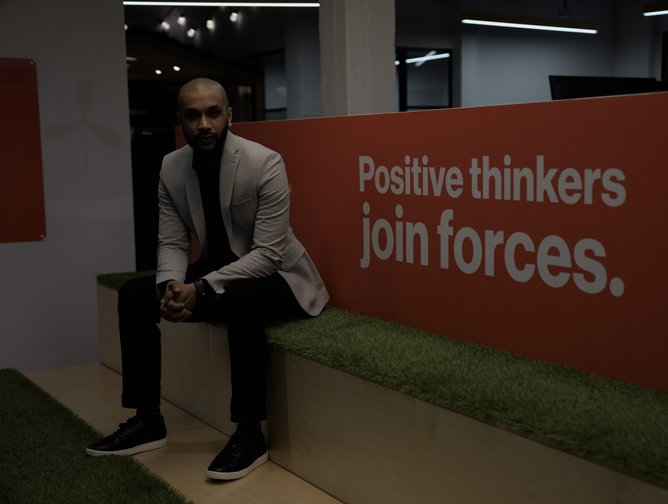
- Resurgence of Manufacturing Powering ReindustrialisationSustainability
- What's Apple’s Promise on Clean Energy and Water Investment?Renewable Energy
- ABB Electrification supports GridBeyond’s AI Energy SolutionTechnology & AI
- Colgate-Palmolive’s Energy Efficiency Recongised Once AgainSustainability

